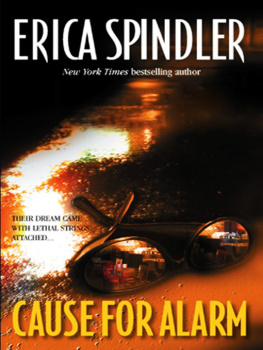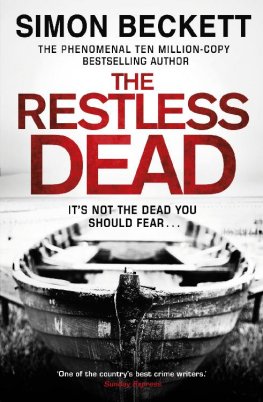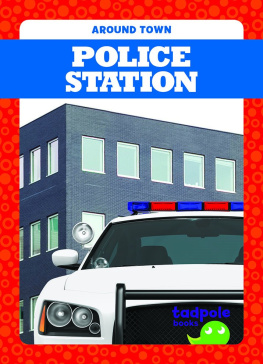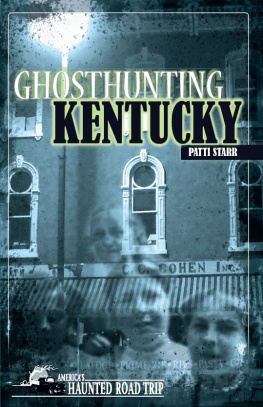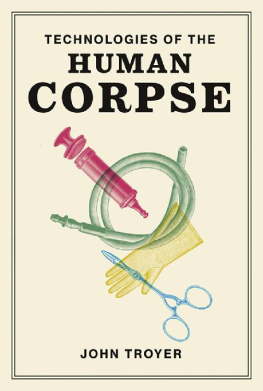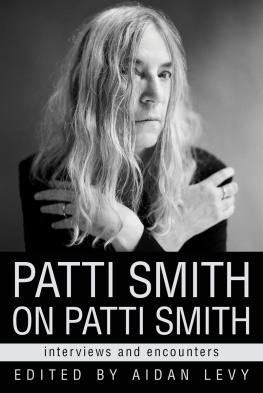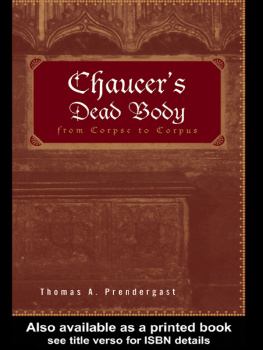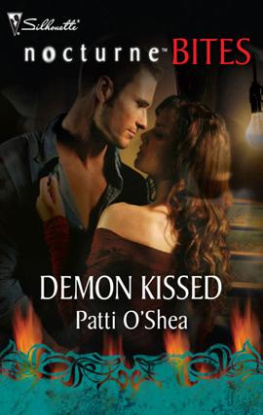
Erica Spindler
Last Known Victim
I dedicate this book to the city of New Orleans:
To her beauty and grace. Her history, diversity and color.
To the strength and joie de vivre of her people.
Laissez les bon temps rouler!
New Orleans, Louisiana
Sunday, August 28, 2005
4:00 p.m.
The gods were watching over New Orleans. Or so it seemed. How else could this historic city built below sea level, this beautiful jewel set in a swamp, have survived?
Survival. Of the species. The fittest. The self. An instinctual response to fight for life. To fight back.
Would she?
Walk to the door. Open it.
There she was. Lying on the bed. Asleep. Bitch! Cheap, faithless whore!
She deserves it. She betrayed you. Broke your heart.
She stirred. Moaned. Her eyelids fluttered.
Quickly! Cross to the bed. Put your hands around her throat and squeeze.
Her eyes snapped open. Pools of blue terror. She bucked and clawed.
Tighter. Tighter. Her fault. Hers. Bitch! Betrayer!
Her creamy skin mottled, then purpled. Her eyes bulged, popping out like those of some freakish cartoon character.
No pity. No second thoughts. She brought this on herself. She deserves it.
Her hands dropped. Her body shuddered, then stilled.
Halfway there. Breathe deeply. Calm yourself. Finish what she forced you to do.
A scream shattered the silence. A loud crack, like a gunshot, shook the house.
Only the wind. Katrinas fury. Move, quickly! Good. Now check your equipment. Make certain you have everything you need.
Industrial-strength trash bags. Rubber gloves and boots. Foul-weather gear. Shiny new bone saw. Pretty, pretty saw.
Zip-closure plastic bag.
No one to hear. No one to come. All gone.
An empty city.
New Orleans, Louisiana
Wednesday, August 31, 2005
3:00 p.m.
Aghost town, Captain Patti OShay thought. Or a scene from some post-apocalyptic horror flick. No cars or buses. No people on the sidewalks or lounging on porches. Eerily quiet.
She crept along Tchoupitoulas Street, heading uptown, maneuvering past downed power lines, branches and trees, sometimes having to go off road. Struggling to keep her attention on the task of driving. And to keep exhaustion and despair at bay.
Katrina had hit and all the Doomsday predictions had come true: the levees had begun to break and the bowl that was the Big Easy had begun to fill with water.
Ninety percent of the metro area-including police headquarters-had flooded. Only the high ground had escaped: the French Quarter, parts of the Central Business District, pockets of the Garden District and Uptown. And this street, which ran along the ridge of the Mississippi River.
The city was without power. Without running water. Without access to supplies. Twenty-five percent of the NOPDs vehicles had flooded.
Citizens who hadnt evacuated were now trapped. On rooftops and in attics. On the interstates and bridges. Dying in the brutal heat, without food, water or medical care.
Now the looters, junkies and thugs had taken to the streets.
The NOPD had established Harrahs Casino, located high and dry at the foot of Canal Street, as their staging area. The Royal Sonesta, one of the French Quarters swankiest hotels, now served as the temporary police headquarters.
She tightened her fingers on the steering wheel. All communications were down. The police department had been reduced to using a handful of walkie-talkies and one ad hoc, mutual-aid radio channel. A channel they were sharing with all other parish agencies and the state police.
Because of a talk around feature, communication between parties more than five miles apart was impossible, rendering unit commanders without a chain of command. To make matters worse, the various agencies kept cutting over one another, creating the cacophony she was listening to now-a stream of disjointed alerts, updates, conversations and requests for assistance.
It was something, at least. Fellow survivors, agencies struggling to restore normalcy. Audible proof that the world had not come to an end.
Though she feared hers had.
Her husband, Captain Sammy OShay, was missing.
She had neither seen nor heard from him since the Sunday before the storm. All officers had been required to remain on duty during the hurricane. She and Sammy had attended early mass at St. Louis Cathedral, then prepared to go out separately on patrol.
She remembered stepping outside of the church and being struck by an overwhelming sense of loss. Of dread. It gripped her so tightly, she caught her breath.
Sammy looked at her. What is it, love?
She shook her head. Nothing.
But he had known better and curled his fingers around hers. Always her rock, her shelter in a storm.
Its going to be fine, Patti. Business as usual by Wednesday.
They had hugged and parted. Then all hell had broken loose.
Today was Wednesday, Patti realized, thoughts returning to the present. And nothing was business as usual.
Where was he?
Patti suddenly felt chilled, despite the oppressively hot, humid air streaming through the cruisers open windows. She shook her head, against the fear, the sense of dread.
Sammy was fine. Hed gone home to check on the house or look for her and been trapped by floodwaters. Or he had gotten trapped trying to help citizens escape. Thats the kind of man Sammy was.
He was resourceful. If he had been injured, he knew to take refuge and await help.
So many were missing. So many were dead.
The walkie-talkie crackled and squawked. A number of buildings burned out of control in the metro area. There were reports of hundreds of displaced citizens converging on the convention center, of gunshots fired at the Superdome, of private militia teams arriving by choppers.
Hearsay and rumor. With no way of being substantiated because of the breakdown in communication.
Where was Sammy?
Suddenly the conversations stopped, overridden by an extended squeal. The sound affected her like a blow. Pressing and holding the radios emergency button was one way to clear the channel for an emergency alert on this primitive form of communication. The protocol signaled users to stay off the channel until the alert was issued.
Officer down. Repeat, officer down. Audubon Place.
Patti unclipped her walkie-talkie and brought it to her mouth. Captain Patti OShay here. Im on Tchoupitoulas, approaching Jackson Avenue. Can I get to Audubon Place from here? Advise.
She was immediately inundated with advice on which streets were passable: one lane on both Jackson and Louisiana Avenues had been cleared. Once she hit St. Charles Avenue, she would have to drive the streetcar tracks on the neutral ground, which had been cleared by Bobcats.
Audubon Place was the most palatial street in New Orleans, perhaps the entire South. A gated community of twenty-eight mansions, it was home to wealthy old-line, New Orleans families, captains of industry and the president of Tulane University.
Located uptown on St. Charles Avenue, across from Audubon Park and bounded by the university campus, itd been left mostly unscathed by the storm.
A juicy-and vulnerable-sitting duck for looters.
Patti made her way there, thoughts whirling. The report could turn out to be false-many had in the past couple of days. If it wasnt, who was the officer? How extensive were his injuries-and how the hell would she get him medical treatment?
Next page

